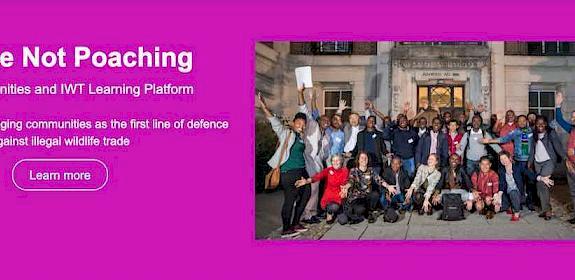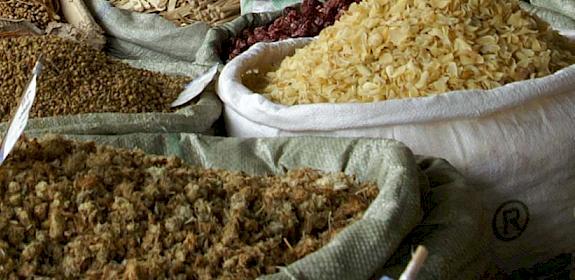Post-2020 global biodiversity framework must focus on sustainable use, strong indicators and the links with human health
Cambridge, UK: 16th February 2021 - With governments meeting this week to discuss targets and indicators for the post-2020 global biodiversity framework, TRAFFIC urges Parties to strengthen global efforts to ensure trade and use of species is legal, at sustainable levels and safe, and effectively measure progress on the implementation of these efforts.
Parties to the Convention on Biological Diversity (CBD) will meet this week for an Informal Virtual Session of the CBD’s 24th meeting of the Subsidiary Body on Scientific, Technical and Technological Advice (SBSTTA 24), with a key agenda item being the post-2020 global biodiversity framework – including the targets that will replace the current Aichi Biodiversity targets set for the Strategic Plan for Biodiversity 2011-2020.
The updated zero draft of the post-2020 framework published in August 2020 currently features a target that directly addresses the issue of wildlife trade, and commits Parties to "ensure that the harvesting, trade and use of wild species of fauna and flora is legal, at sustainable levels and safe" by 2030.
This is the first time since the Convention’s entry into force in 1993 that a target specifically addressing wildlife trade is being considered. The current draft also includes a target that recognises the importance of considering the benefits to conservation and humans of sustainable use, with a target urging that "By 2030, ensure benefits, including nutrition, food security, livelihoods, health and well-being, for people, especially for the most vulnerable through sustainable management of wild species of fauna and flora".
TRAFFIC Director of Policy Sabri Zain warmly welcomes the new targets being discussed that are giving increased attention to the issue of sustainable use of biodiversity.
Inclusion of these targets reflects the importance of sustainable use of the components of biodiversity as one of the three goals of the Convention. It also represents the important role that the post-2020 framework will play in addressing the second biggest driver of negative impacts on nature.”
Sabri Zain, TRAFFIC Director of Policy
In May 2020, a landmark report from the Intergovernmental Science-Policy Platform on Biodiversity and Ecosystem Services (IPBES) provided overwhelming evidence that nature is declining globally at rates unprecedented in human history, eroding the very foundations of our economies, livelihoods, food security, health and quality of life worldwide. The report identified the direct exploitation of animal and plant species, including harvesting, hunting, fishing and logging as the second biggest driver of negative impacts on nature, after changes in land and sea use.
“It is also important that, beyond these two Targets, Parties consider the other targets in the draft post-framework where it is important to recognise the contribution of sustainable wildlife use to halting the biodiversity loss,” Zain added. “These include targets related to access to and the fair and equitable sharing of benefits, ensuring that biodiversity values are mainstreamed across all sectors; and ensuring production practices and supply chains are sustainable.”
“We encourage continued attention being given to sustainable use in deliberations on these targets, given its role as a durable and powerful incentive for conservation of wildlife and recognising the crucial contribution that sustainable wildlife management and use makes to the food security, health, income, jobs and well-being of humans, particularly Indigenous Peoples and Local Communities.”
While the attention being given to these targets is welcomed, TRAFFIC believes that the adoption of strong indicators for these targets is essential for measuring progress on the effectiveness of their implementation.
“Without robust indicators measuring the progress of effective target implementation, we will be doomed to repeat the results of the Global Biodiversity Outlook (GBO-5) released last September, which suggests that none of the 20 Aichi biodiversity Targets will be fully met. An effective monitoring mechanism and robust indicators are absolutely essential if the post-2020 framework is to be implemented effectively and will indeed prompt the transformative changes needed to reverse the rapid decline in nature. TRAFFIC stands ready to assist Parties with the relevant research and information needed in order to develop and measure progress on these indicators,” Zain added.
For example, conservation of flora species generally receives less attention compared to other areas of wild species use and trade. The FairWild Standard provides a valuable tool to measure progress towards the sustainable use of plant diversity, and is being used by a growing number of companies for products sourced in countries around the world.
“TRAFFIC’s work implementing this standard can be a practical way which we can contribute data to measuring the progress on the conservation of world’s flora,” Zain added. The FairWild Standard is recognized by the CBD’s Global Strategy for Plant Conservation, which on the agenda for discussion at SBSTTA 24.
The current COVID-19 pandemic has also put the spotlight on wildlife and its potential role in the transmission of zoonotic disease, highlighting the intimate link between human, animal and environmental health. A special virtual session was held in December on Biodiversity, One Health and COVID-19 in preparation for SBSTTA 24.
“We are happy that Parties are taking this issue seriously and hope discussions this week will consider a balanced approach that will provide a strong role for the post-2020 framework in contributing to global efforts to prevent future outbreaks of zoonotic disease, while strengthening the conservation of wildlife and respecting livelihoods, food security and the culture of diverse groups of people” Zain noted.
In October 2020, the members of the Collaborative Partnership on Sustainable Wildlife Management (CPW) published a joint statement setting out guiding principles aimed at reducing the risk of future pandemics originating from wild animals. The CPW is a voluntary partnership of 14 international organisations with substantive mandates and programmes for the sustainable use and conservation of wildlife resources, including the Secretariats of the Convention on Biological Diversity (CBD), Convention on International Trade in Endangered Species of Wild Fauna and Flora (CITES), World Organisation for Animal Health (OIE), Food and Agriculture Organization (FAO), as well as NGOs such as TRAFFIC.
The Informal Virtual Session in preparation for SBSTTA 24 will take place during 17 - 19 February 2021 and 24 - 26 February 2021.




